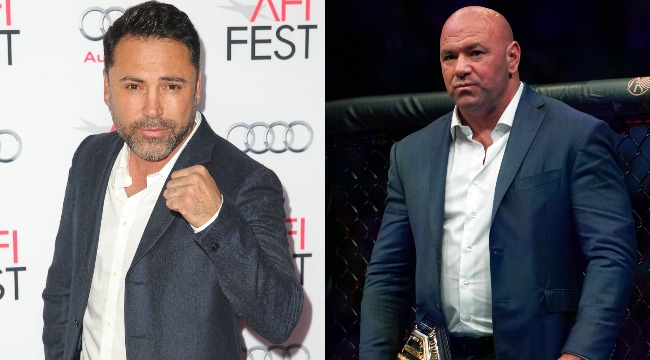
Getty Image Composite
Dana White dashed what Georges St. Pierre called “a dream come true” when blocking a potential superfight boxing match between GSP and boxing icon Oscar De La Hoya.
While Dana has remained mum on the situation, he likely nixed the fight due to its tie to the video-sharing social networking service Triller, who White has consistently blown off and claimed the company lied about the numbers Triller generated by Jake Paul’s fight with former UFC fighter Ben Askren.
In an interview with CinemaBlend, GSP was genuinely disappointed the UFC President put the kibosh on the fight:
I understand that Dana didn’t want me to fight. However, it would have been fun. Because my career as a professional fighter, to become the best in the world in mixed martial arts, is done. I’m turning 40 years old tomorrow; I’m going to be 40 years old. It’s a young man’s game. However, to rather fight a boxing match under the rules that Triller put on against the legendary Oscar De La Hoya? For me, it would have been a dream come true, because he is my second favorite boxer of all time, behind Sugar Ray Leonard. Plus, a lot of the money made would have been given to charity. So it would have been for a good cause, just to show that we don’t take ourselves too seriously. And it would have been serious competition because you say, I play basketball, I play hockey, but you don’t ‘play’ fighting. It would have been fun.
De La Hoya was a little less diplomatic in his response, going as far to challenge White to a fight.
.@danawhite Quit blocking@GeorgesStPierre’s chance to fight. How about we get into the ring first little B*#ch then after I kick your ass, I’ll fight a real man #DeLaHoyaGSP #LetGSPFight pic.twitter.com/sPKeXpHDDW
— Oscar De La Hoya (@OscarDeLaHoya) May 21, 2021
Triller President Ryan Kavanaugh attempted to sweeten the pot, offering Dana a $250,000 donation to a charity of Dana’s choice if he green-lit the fight.
Dana has yet to respond.